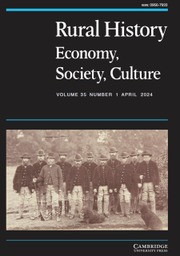Article contents
Earnings, Poor Relief and the Economy of Makeshifts: Bedfordshire in the Early Years of the New Poor Law
Published online by Cambridge University Press: 29 March 2005
Abstract
It is increasingly recognised by those engaged in the debate concerning the standard of living of workers during industrialisation that all forms of household income need to be assessed, not just male waged work. A more holistic approach also considers women and children's earnings, poor relief, and the wide range of self-provisioning activities and resources available through the ‘economy of makeshifts’. Over one hundred household budgets of agricultural labourers and their families have been analysed from the Ampthill Union, Bedfordshire, just before and during the implementation of the new poor law in order to further explore and quantify all components to the household income of labouring families in this key transition decade. The article finds that poor relief to families was cut in the wake of the Poor Law Amendment Act. It also finds that the low incomes of families necessitated supplementation through making shift. When the makeshift economy is quantified, it becomes clear that such activities could significantly supplement incomes.
- Type
- Research Article
- Information
- Copyright
- © 2005 Cambridge University Press
- 13
- Cited by


